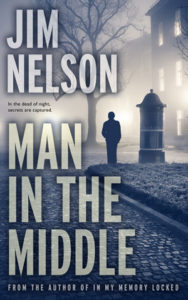At Washington Independent Review of Books, author Tara Laskowski asks, “We’re living through a pandemic. Must we read about one, too?” Her suggestion to fellow writers:
Perhaps the solution is to just skip ahead and set everything in 2025, safely away from the horror that is this year …
In 20 years or so, this point will probably be moot. By then, we’ll be ready to curl up with an escapist historical novel set in 2020; we’ll have gotten enough social distance from masks and lockdowns and toilet paper shortages.
My perspective on all this is colored by the fact that I wrote a novel set during 2020, and it centers around the pandemic and quarantines that have affected us all.
To clarify the chronology, I started writing the book in June (or so) and published it last month. Man in the Middle is set in the first week of California’s shelter-in-place, and although March was not so long ago, paging through my diary entries of those early weeks while preparing the novel reminded me just how otherworldly the world became overnight.
That’s a key point about the book’s development: I started keeping a diary when the pandemic surged in America. For the first few months, I wrote daily, almost religiously, dumping my despair and puzzlement onto the page. When the world opened up and grew less tense, I thumbed back through my notebook and discovered a voice I did not quite know. It was me, but it was not a me I easily recognized.
Certainly I harbored many reservations before I set out to write the first draft. Was the world to be swamped with a flood of coronavirus thrillers? What if a cure is discovered tomorrow? One writer friend warned me off the project entirely. From other people, there’s been a split-brain response: On one hand, writing a book now about the pandemic is “obviously” a commercial money-grab on my part, right? On the other hand, the market for such a book has a tight, closing window, once the vaccines arrive, eh? It’s one of those social situations where they think I’m not seeing the obvious, when in fact I’d gone down those thought-paths several dozen times.
I don’t write fiction to make money. Fiction is freeing for me. No one tells me what to write or how to write it. I set my deadlines. I make my own challenges. I also happen to believe there are readers in this world who, once they’re exposed to my writing, will enjoy it as well. That, more than anything, motivates me to keep writing.
Laskowski relates a comment from her agent:
“If something is set this year and is about the quarantine experience, sort of like a locked-room crime, maybe,” she says. “But a medical thriller about covid? Nope.”
A medical thriller is exactly the kind of novel I told myself I would not write: The beautiful epidemiologist racing the clock to develop a cure; a cold-hearted technocracy blocking her progress at every turn; and her unconscious child in a hospital isolation unit hooked up to a respirator. But the reason not to write a medical thriller about coronavirus is not because we’re living through it—it’s because that thriller has been written many times over, only with different strains of disease of different origin, with different symptoms and different cures.
While I didn’t write a locked-room crime book, I knew early on I wanted it to be a novel of isolation and suspense. The year that is 2020 has been a year of unthinkables. It is also a year hosting a major, tumultuous presidential election set against a backdrop of accusations of foreign and domestic intrigue. Swirled together, these ingredients sent me back to the great political and conspiracy films of my youth (Three Days of the Condor, Invasion of the Body Snatchers, 12 Monkeys). In January, when COVID-19 was a curiosity mentioned occasionally in the news, I was reading Orwell’s war diaries, which also left a strong impression upon me. In March, when the shelter-in-place orders came down, I reread Camus’ The Plague with fresh eyes and a fresh appreciation.
Out of all this arable soil grew a claustrophobic, paranoid book about an isolated security guard who can’t tell if he’s detaching ever-so-gradually from reality. Podcasts, experts, and so-called experts fill his ears with contradictory takes on the world’s sudden course correction. That voice from my diary was now his.
Why wouldn’t I write that book? Whether or not Man in the Middle succeeds on its merits, I’ll let the readers decide. But how could I just set this inspiration aside and write about any year except 2020?

To return to the original question, no, I don’t believe people should have to read about the pandemic right now. I understand why anyone who reaches for a book today would want to read about any subject other than pandemics. Subconsciously, though, the question naturally bleeds into the territory of, Should writers be writing about the pandemic now?
As an answer, consider re-framing the original question as “We’re living through the Great Depression. Must we read about it, too?”
Imagine if the writers of The Grapes of Wrath, The Day of the Locust, The Road to Wigan Pier, They Shoot Horses, Don’t They?, John Dos Passos with his U.S.A. trilogy—and more—decided not to write about the worldwide economic collapse because people were living through it, so why would they want to read about it? For many of those authors ninety years ago, they viewed writing about the Great Depression as a responsibility.
Man in the Middle isn’t an act of personal responsibility, but I did write it for good reasons, even if they’re only my reasons.
(Probably unnecessary disclosure: Tara Laskowski is an editor for Smokelong Quarterly, which published one of my stories years ago. I don’t know if she was an editor there at that time.)
